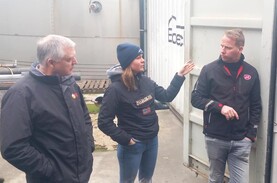After being deferred on five separate occasions, the UK will put full border controls in place on 31 January.
This is three years after the UK left the EU single market - and therefore three years since the EU introduced full border controls on goods entering the bloc from the UK.
While the constant delays to the introduction of the measures by the UK may have proven somewhat frustrating, it does mean that Irish exporters have had considerable time to get to know how to have their paperwork in order for day one of the new regime.
The three important changes that will apply to Irish exporters are: pre-notification requirements for live animals, animal products and high- and medium-risk category plant products; full customs controls; health certification on medium risk animal products, plants, plant products and high-risk food and feed of non-animal origin.
It is important to note that both exporters directly to Britain and exporters using the UK landbridge to EU customers will be affected by the new rules.
Requirements
Also, the new requirements do not apply to goods moving between Ireland and Northern Ireland. However, goods exported to Northern Ireland for onward shipment to the UK will be subject to the rules.
Tánaiste Micheál Martin TD said that he is “encouraging all Irish companies to speak to everyone in their supply chain and make sure they are ready for the new UK processes”.
Highlighting the particular impact the rules would have on the agri-food sector, Minister for Agriculture Charlie McConalogue said: “All businesses in the agri-food supply chain to GB must continue to engage with their UK customers, their local supervisory competent authority team and logistics providers to confirm the processes are in place to meet the new UK requirements in the most effective and efficient manner.”
Most recent analysis from Bord Bia shows that in the 12 months to November 2023, Ireland’s food, horticulture and seafood exports to the UK topped €5.3bn, an increase of more than €1bn over the 2020 level.
Any increase in border friction is an unwelcome development for Irish exporters. The extra regulatory burden on the landbridge is particularly unwelcome.
However, there can be no producer here that is not fully up to speed on what the changes mean. They have been so long coming and so well explained by the Department of Foreign Affairs here that any exporter caught off guard only has themselves to blame.
It is extremely unlikely that there will be any delay at Irish ports when the rules come in. But that does not mean they will have no real effect.
Any increase in regulation will also mean an increase in costs - costs which will have to be passed on to customers.
It may give Irish exporters another push in trying to find more mainland EU markets - as they remain completely open to what we produce here.
Overall, from 31 January, the UK will become a little more isolated from its closest neighbours and while that is the path the country has chosen, it is unfortunate that Irish food producers will have to bear some of the costs of that decision.






 This is a subscriber-only article
This is a subscriber-only article










SHARING OPTIONS: